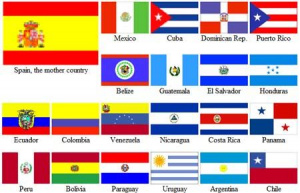Language/Spanish/Grammar/Adjectives
Hi Spanish learners! 😊
In this lesson, we will learn about adjectives in the Spanish language. Adjectives are very important and useful in any language because they provide additional information to the noun they modify.
Adjectives in Spanish have some specific rules that differ from English. Let's dive in!
Don't miss the chance to check out these pages as you wrap up this lesson: Plural, Masculine and Feminine, Demonstrative Adjectives & Direct Object Pronouns.
What are Adjectives in Spanish?[edit | edit source]
Adjectives are words used to describe or modify nouns. In Spanish, adjectives have to agree with the gender and number of the noun they are describing. Generally, adjectives have to be placed after the noun.
For example:
| Spanish | Pronunciation | English Translation |
|---|---|---|
| La casa grande | lah KA-sah GRAHN-deh | The big house |
| Las flores blancas | las FLO-res BLAHN-kahs | The white flowers |
| El chico joven | el CHEE-koh HO-ven | The young boy |
| Los coches rápidos | los KO-ches RAH-pee-dohs | The fast cars |
Gender Agreement of Adjectives[edit | edit source]
In Spanish, every noun has a gender either masculine or feminine. Similarly, every adjective also has a gender. So the adjective has to agree in gender with the noun it is describing.
For example:
| Spanish | Pronunciation | English Translation |
|---|---|---|
| El perro inteligente | el PEH-ro een-teh-lee-HEN-teh | The intelligent dog (masculine) |
| La gata inteligente | la GA-tah een-teh-lee-HEN-teh | The intelligent cat (feminine) |
In the above example, we have used the same adjective “inteligente” with both masculine and feminine nouns to show the gender agreement.
Number Agreement of Adjectives[edit | edit source]
Like gender, every noun in Spanish has a number either singular or plural. And as expected, adjectives also follow the same rules. The adjective has to match the number of the noun it is describing.
For example:
| Spanish | Pronunciation | English Translation |
|---|---|---|
| El cuaderno verde | el kwa-DEHR-noh BEHR-deh | The green notebook (singular) |
| Los cuadernos verdes | los kwa-DEHR-nos BEHR-dehs | The green notebooks (plural) |
In the above example, the adjective "verde" has been modified to "verdes" to match the plural form of "cuadernos".
Position of Adjectives in Spanish[edit | edit source]
In Spanish, adjectives are generally placed after the noun they are describing. Although some adjectives can come before the noun, in most situations, adjectives come after the noun in the sentence.
For example:
| Spanish | Pronunciation | English Translation |
|---|---|---|
| La casa grande | lah KA-sah GRAHN-deh | The big house |
| El libro interesante | el LEE-broh in-teh-reh-SAHN-teh | The interesting book |
Irregular Adjectives[edit | edit source]
There are some irregular adjectives in Spanish that don’t follow the regular rules or patterns. Some of these irregular adjectives include:
- Bueno/Buen – Good
- Malo/Mal – Bad
- Grande – Big or Large
- Pequeño/Pequeña – Small
- Joven – Young
- Viejo/Vieja – Old
- Nuevo/Nueva – New
Here are some example sentences using irregular adjectives:
- Person 1: ¿Has visto la película nueva? (Have you seen the new movie?)
- Person 2: Sí, es muy buena. (Yes, it is very good.)
- Person 1: El abuelo es viejo pero simpático. (The grandfather is old but friendly.)
- Person 2: Sí, el abuelo es muy amable conmigo. (Yes, the grandfather is very kind to me.)
Dialogue[edit | edit source]
Let's now see some examples of adjectives in context in a dialogue between two friends:
- Person 1: Hola, ¿cómo estás? (Hi, how are you?)
- Person 2: Bien, gracias. ¿Y tú? (I'm good. Thank you. And you?)
- Person 1: Estoy cansado hoy. (I'm tired today.)
- Person 2: ¿Por qué estás cansado? (Why are you tired?)
- Person 1: Porque tengo un coche rápido. (Because I have a fast car.)
- Person 2: ¡Qué suerte tienes! (You're so lucky!)
Conclusion[edit | edit source]
Adjectives are important in Spanish grammar because they add information to the nouns. Knowing the grammar rules allow better comprehension and communication when speaking or writing in Spanish. Practice is essential to master the gender and number agreement of adjectives, so don't hesitate to find native speakers to converse with through Polyglot Club.
For more grammar lessons in Spanish, please visit the Spanish Grammar section in our website.
➡ If you have any questions, please ask them in the comments section below.
➡ Feel free to edit this wiki page if you think it can be improved. 😎
Having concluded this lesson, consider checking out these related pages: El Verboide, Present Perfect Tense, Orientación sobre el uso de Articulos & Simple Past Tense.
Videos[edit | edit source]
How to Use Adjectives in Spanish: Rules + Examples - YouTube[edit | edit source]
Spanish Adjectives - YouTube[edit | edit source]
Adjectives in Spanish with examples - YouTube[edit | edit source]
Spanish Adjectives - YouTube[edit | edit source]
Other Lessons[edit | edit source]
- Interrogation signs
- Los Articulos
- The word that cannot be written
- El tiempo presente
- Simple Present Tense
- Imperfect Tense
- ¿Pluscuamperfecto?
- Future Tense
- How to use articles in spanish
- Sentense Structure
Sources[edit | edit source]
- Introduction to Adjectives - Spanish Grammar in Context
- Adjectives in Spanish Grammar
- How do you use adjectives in Spanish? | Learning Spanish - Grammar


